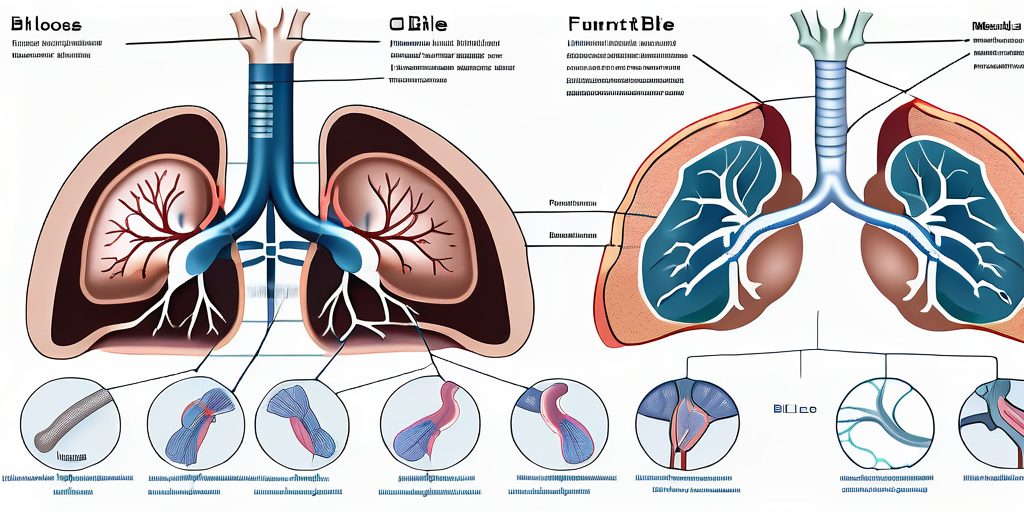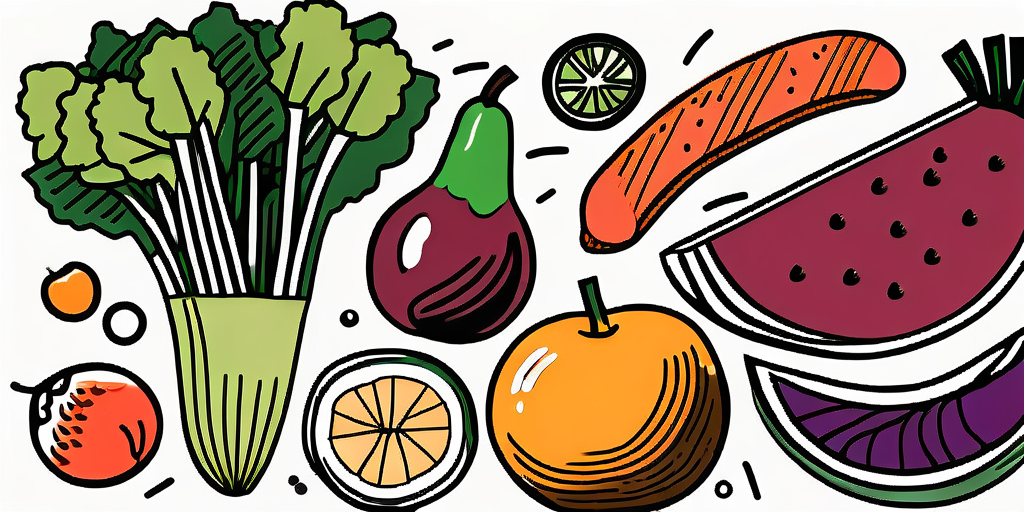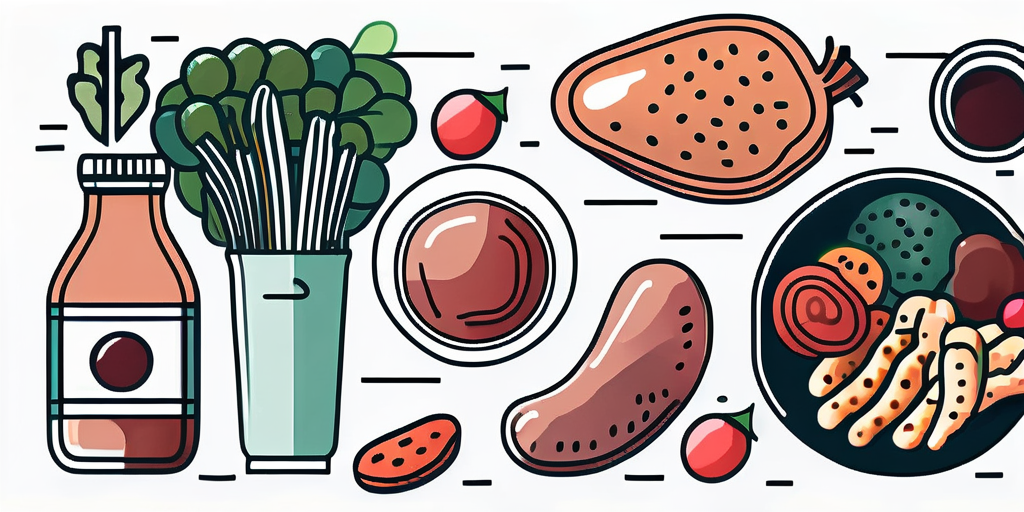The liver is an incredibly important organ in the human body. It plays a crucial role in various bodily functions, including digestion, metabolism, and detoxification. Taking care of your liver is essential for maintaining overall health and preventing liver diseases. In this ultimate guide, we will explore the function of the liver, the importance of a healthy liver diet, and the nutritional requirements to support liver health. We will also discuss foods to include in a healthy liver diet and foods to avoid for optimal liver function.
Understanding the Function of the Liver
The liver is an incredibly complex organ that performs a wide range of vital functions in our bodies. One of its primary roles is to aid in digestion, ensuring that our bodies can efficiently break down and absorb the nutrients we consume.

One of the liver's most important contributions to digestion is the production of bile. Bile is a substance that is stored in the gallbladder and released into the small intestine when needed. Its main function is to break down fats into smaller particles, making them easier for the body to absorb and utilize. Without bile, the digestion and absorption of fats would be significantly impaired.
But the liver's involvement in digestion doesn't stop there. It also plays a crucial role in the absorption of fat-soluble vitamins, such as vitamins A, D, E, and K. These vitamins are essential for various bodily functions, including vision, bone health, and blood clotting. Without the liver's assistance, our bodies would struggle to absorb and utilize these vital nutrients.
In addition to its role in digestion, the liver is also responsible for detoxification. Every day, our bodies are exposed to a wide range of toxins, drugs, and other harmful substances. The liver acts as a filter, removing these toxins from the bloodstream and ensuring their elimination from the body.
The liver accomplishes this detoxification process through a two-step mechanism known as phase I and phase II detoxification. In phase I, various enzymes in the liver break down toxins into less harmful forms. This step prepares the toxins for phase II, where they are further neutralized and eliminated from the body.
Supporting optimal liver function is crucial for maintaining overall health and well-being. One way to do this is by following a healthy liver diet. A healthy liver diet consists of foods that promote liver health and provide the necessary nutrients for its optimal function.
Some foods that are beneficial for the liver include leafy green vegetables, which are rich in antioxidants and help protect the liver from damage. Cruciferous vegetables like broccoli and cauliflower contain compounds that support the liver's detoxification process. Fatty fish, such as salmon and mackerel, are high in omega-3 fatty acids, which have anti-inflammatory properties and can help reduce liver inflammation.
In addition to a healthy diet, regular exercise and maintaining a healthy weight are also important for liver health. Excess weight and a sedentary lifestyle can contribute to fatty liver disease, a condition in which fat accumulates in the liver and impairs its function.
Understanding the function of the liver and taking steps to support its health is essential for overall well-being. By making conscious choices about our diet and lifestyle, we can ensure that our liver continues to perform its vital functions and keeps us healthy.
Importance of a Healthy Liver Diet
A healthy liver diet is essential for maintaining overall health and preventing liver diseases. The liver relies on specific nutrients to perform its functions effectively. A well-balanced diet that includes foods rich in essential vitamins, minerals, proteins, and fats can support liver health and enhance its ability to detoxify the body.
The liver, one of the largest organs in the human body, plays a crucial role in maintaining our overall well-being. It acts as a filter, removing toxins and waste products from the blood, metabolizing nutrients, and producing bile to aid in digestion. Without a healthy liver, our bodies can become overwhelmed with toxins, leading to various health issues.
Impact on Overall Health
A healthy liver is crucial for overall health and well-being. When the liver is functioning optimally, it helps regulate cholesterol levels, blood sugar levels, and hormone production. It also aids in the digestion and absorption of nutrients, ensuring that our bodies receive the necessary vitamins and minerals for optimal health. By following a healthy liver diet, you can support these functions and maintain overall well-being.
Furthermore, a healthy liver contributes to a strong immune system. It produces immune factors that help fight off infections and diseases, keeping us protected from harmful pathogens. By nourishing our liver with a nutrient-rich diet, we can strengthen our immune system and improve our body's ability to defend against illnesses.
Prevention of Liver Diseases
A healthy liver diet can significantly reduce the risk of liver diseases such as fatty liver disease, hepatitis, and cirrhosis. These conditions often result from poor dietary choices, excessive alcohol consumption, and exposure to toxins. By making conscious decisions about the foods we consume, we can protect our liver from damage and maintain its optimal functioning.
Consuming a diet rich in fruits, vegetables, whole grains, lean proteins, and healthy fats can provide the liver with the necessary nutrients it needs to function properly. These foods are not only beneficial for the liver but also for the overall health of our bodies. They contain antioxidants, which help reduce inflammation and oxidative stress, both of which can contribute to liver damage.
In addition to a healthy diet, regular exercise and maintaining a healthy weight are also important factors in liver health. Physical activity helps improve blood flow to the liver, promoting its ability to detoxify the body. It also aids in weight management, as obesity is a risk factor for liver diseases.
By adopting a healthy liver diet and lifestyle, we can protect this vital organ and promote our overall well-being. It is essential to prioritize our liver health and make conscious choices that support its optimal functioning. Remember, a healthy liver means a healthier you!
Nutritional Requirements for a Healthy Liver
Providing your liver with the right nutrients is essential for its optimal functioning. Let's explore the key nutritional requirements for a healthy liver.
The liver, one of the largest organs in the body, performs numerous vital functions. It metabolizes nutrients, detoxifies harmful substances, produces bile for digestion, stores vitamins and minerals, and synthesizes proteins. To support these functions, it is crucial to maintain a well-balanced diet that includes essential vitamins, minerals, proteins, and fats.
Essential Vitamins and Minerals
Vitamins and minerals play a crucial role in supporting liver health. Vitamin E, for example, is a powerful antioxidant that protects the liver from oxidative stress. It can be found in foods such as nuts, seeds, and leafy green vegetables. Additionally, vitamin C is important for collagen synthesis, which helps maintain the structural integrity of liver cells. Citrus fruits, strawberries, and bell peppers are excellent sources of vitamin C.
Minerals like selenium and zinc are also essential for liver health. Selenium acts as a cofactor for antioxidant enzymes, while zinc supports liver regeneration and detoxification processes. Incorporating foods like Brazil nuts, seafood, whole grains, and legumes into your diet can help ensure an adequate intake of these minerals.
Furthermore, maintaining proper hydration is essential for liver health. Drinking an adequate amount of water helps flush out toxins and supports the liver's detoxification processes.
Role of Proteins and Fats
Proteins and fats are essential macronutrients that support liver health. Adequate protein intake helps repair damaged liver cells and supports the production of enzymes that aid in the detoxification process. Good sources of protein include lean meats, poultry, fish, legumes, and dairy products. Additionally, incorporating plant-based proteins like tofu, tempeh, and quinoa can provide a variety of essential amino acids necessary for liver health.
When it comes to fats, opting for healthy fats is crucial for liver health. Monounsaturated fats found in foods like avocados, nuts, and olive oil have been shown to reduce inflammation and improve liver function. Omega-3 fatty acids, found in fatty fish like salmon and mackerel, have anti-inflammatory properties and can help prevent liver damage. It is important to avoid or limit saturated and trans fats, as they can contribute to liver damage and increase the risk of non-alcoholic fatty liver disease.
In conclusion, maintaining a healthy liver requires a well-balanced diet that includes essential vitamins, minerals, proteins, and fats. By incorporating a variety of nutrient-rich foods into your daily meals, you can provide your liver with the necessary support for optimal functioning and overall health.
Foods to Include in a Healthy Liver Diet
To promote optimal liver function, it is important to include specific foods in your diet that support liver health. Let's explore some of these foods.

The liver is an essential organ responsible for detoxification, metabolism, and the production of bile. By incorporating certain foods into your diet, you can help support its function and overall health.
Fruits and Vegetables for Liver Health
Fruits and vegetables are not only delicious but also rich in antioxidants, vitamins, and minerals that support liver health. Incorporating a variety of colorful fruits and vegetables into your diet ensures a diverse range of nutrients that can benefit your liver.
Berries, such as blueberries, strawberries, and raspberries, are packed with antioxidants that help protect liver cells from damage caused by harmful free radicals. Leafy greens, like spinach and kale, are excellent sources of vitamins A, C, and K, as well as minerals like iron and calcium, which are essential for liver function.
Cruciferous vegetables, such as broccoli and cauliflower, contain compounds called glucosinolates that support liver detoxification processes. These vegetables also provide a good amount of fiber, which aids digestion and helps maintain a healthy weight, reducing the risk of fatty liver disease.
Citrus fruits like oranges and lemons are not only refreshing but also rich in vitamin C, which plays a crucial role in liver detoxification. Vitamin C helps stimulate the production of glutathione, a powerful antioxidant that helps protect liver cells from damage.
Whole Grains and Liver Function
Whole grains are an excellent source of fiber, which aids digestion and supports liver health. Opting for whole grain bread, pasta, rice, and cereals can significantly increase your fiber intake, benefiting your liver and overall well-being.
Fiber acts as a natural cleanser for the digestive system, helping to prevent constipation and promoting regular bowel movements. By doing so, fiber helps eliminate toxins and waste products from the body, relieving the burden on the liver.
Furthermore, whole grains are rich in B vitamins, including niacin, riboflavin, and thiamine, which are essential for liver metabolism and energy production. These vitamins play a vital role in breaking down carbohydrates, proteins, and fats, ensuring the liver functions optimally.
Incorporating whole grains into your diet not only supports liver function but also helps maintain stable blood sugar levels, reducing the risk of developing non-alcoholic fatty liver disease (NAFLD) and other metabolic disorders.
Foods to Avoid for Liver Health
While certain foods promote liver health, there are others that should be avoided or consumed in moderation to maintain optimal liver function.

Harmful Effects of Alcohol
Excessive alcohol consumption is one of the leading causes of liver diseases, including alcoholic liver disease and cirrhosis. It is important to limit your alcohol intake or avoid it altogether to protect your liver. If you choose to drink alcohol, do so in moderation and ensure you give your liver time to recover.
Processed Foods and Liver Damage
Processed foods, such as fast food, fried snacks, and sugary treats, can contribute to liver damage. These foods are often high in unhealthy fats, sugar, and additives that burden the liver and hinder its ability to function optimally. Opt for whole, unprocessed foods whenever possible and limit your consumption of processed foods.
In conclusion, maintaining a healthy liver diet is crucial for overall health and well-being. By understanding the function of the liver, the importance of a healthy liver diet, and the nutritional requirements to support liver health, you can make informed choices about the foods you consume. Incorporating liver-friendly foods and avoiding or limiting alcohol and processed foods can go a long way in promoting optimal liver function and preventing liver diseases. Take care of your liver, and it will take care of you!
















